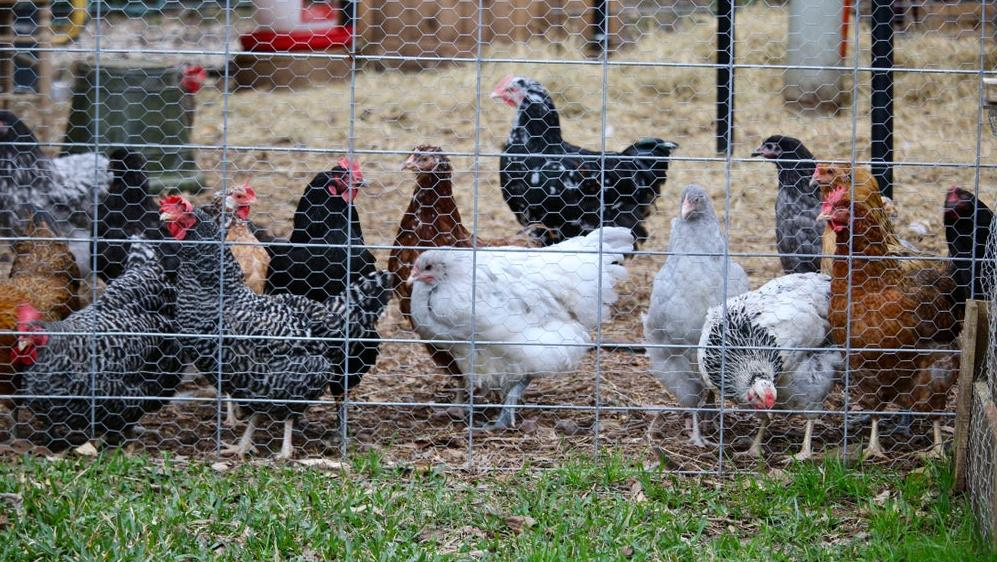Backyard Chickens Won't Save You From High Egg Prices
Put the chick down and step away from the feed bags.
Listen, I completely understand that egg prices are insane right now. But that's no reason to start a backyard chicken farm.
The Houston Chronicle, the Denver Post, The Wall Street Journal, the New York Times, and a number of other outlets have reported that more and more people are investing in raising their own chickens to get a steady supply of eggs rather than pay the high prices at grocery stores.
In Fort Collins, Colorado, a family-owned feed store recently upped its usual order of a couple hundred chicks to sell each week to 1,000 chicks because demand has risen so high. WSJ also reports Purely Poultry, a direct-to-consumer chicken supplier in Wisconsin, has seen a 29% increase in new accounts and a 28% increase in sales compared to last year.
Why egg prices are high right now
This increased interest in backyard farming is of course not because everyone has a sudden craving for omelets. Since January 2022, a particularly contagious strain of avian flu has been laying waste to egg-laying flocks in the U.S., diminishing the amount of total eggs produced and driving up prices.
Currently, according to the Centers for Disease Control and Prevention, the number of affected birds has reached 58.2 million, up from 57.8 million just a week ago. This strain of avian flu is more difficult to deal with because it can spread through wild bird populations as well as poultry birds, and unfortunately, vaccine development is a slow process.
Because of this, people are going to extreme lengths to avoid paying astronomical prices for their cartons. While some are choosing to cross the border for cheaper eggs and risk heavy smuggling fines, others are building coops in their own backyards.
Why buying your own chickens won’t save you money
Like adopting a puppy during quarantine only to return it when lockdowns eased, chicken-rearing is not something to be taken lightly, nor will it necessarily offset egg prices in stores.
First off, every locale has its own rules regarding backyard farming. For example, residents in Denver are required to have a Livestock or Fowl permit, which costs $25. In Chicago, The Takeout's hometown, keeping backyard chickens is perfectly legal, but it's recommended that you have a certain amount of space and keep the noise to a minimum. A Chicago Magazine article from 2018 advises prospective chicken owners to budget for at least three square feet per bird inside the coop (more on that in a bit) and an additional 10 square feet per bird to roam outside.
Next, you have to think about the general care of the birds. Chickens need coops, which cost around $100 if you build it yourself, and anywhere from $300 to $2,800 if you buy one pre-built. Chickens also need warmth from heat lamps and bedding (some sort of soft material) within the coop.
Feeding the birds is another factor in taking on even a small flock. The cost of chicken feed can vary by location and supplier, but Ken Cousino, co-owner of Quality Feed & Garden Co. in Houston, told the Houston Chronicle that hens eat about 40 cents' worth of feed each day. The Chicago Magazine article notes that egg-laying hens need a custom grain-protein meal, so you should expect to spend at least $35 on feed each month for three hens.
Setting aside permits, space, and maintenance costs, there's the actual egg output to consider. The University of Wisconsin-Madison explains that hens begin laying eggs when they're around 18-22 weeks old. So, if you want your eggs fast you'll need to buy a fully grown hen. Plus, egg-laying hens only produce eggs for about three to four years, and their production goes down as they get older. Seasonality is also a factor, as many hens stop laying eggs in the winter unless they get extra warmth from heating lamps. And as gruesome as it sounds, your dogs and cats are always a risk factor, too.
All in all, you can expect to net around 200-250 eggs per chicken per year if everything goes well. Whether or not that's better than paying $5-$9 per dozen at the grocery store is up to you. I will say this, though: If milk prices shoot up, you won't find Bessie the cow in my backyard.
